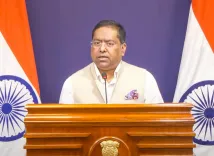Will Most of Trump’s Trade Deals Be Finalized by August 1?

Synopsis
Key Takeaways
- Trump's administration expects most trade deals to be completed by August 1.
- South Korea is negotiating to reduce reciprocal tariffs that could affect its economy.
- Nearly 200 countries may receive letters indicating finalized trade agreements.
- Productive negotiations are ongoing between the U.S. and South Korea.
- Key sectors for cooperation include shipbuilding, semiconductors, and batteries.
Washington, July 26 (NationPress) US President Donald Trump has announced that by August 1, most of his administration's trade agreements with various nations will be completed. This comes as South Korea and other trade partners are actively working to finalize arrangements aimed at reducing their reciprocal tariff rates before the negotiation deadline.
During a press conference at the White House, Trump indicated that his administration might dispatch letters concerning tariff rates to nearly 200 countries, signifying that negotiations have been successfully concluded. He remarked, "They have a deal. It's done."
In particular, South Korea has intensified its efforts to negotiate a deal with the United States to either avoid or lessen the impending 25 percent reciprocal tariffs, as well as specific duties on automobiles and steel. These tariffs could significantly impact South Korea's export-driven economy, according to reports from Yonhap news agency.
"August 1 is approaching, and we will have most of our deals concluded, if not all," Trump stated before departing for Scotland.
He added, "When those letters are sent out ... the page and a half ... that means they have a deal. It's done. They pay that tariff, and that is essentially the contract."
The administration continues to engage in productive discussions with South Korea to address what they perceive as unfair trade barriers while enhancing market access for U.S. businesses, according to a White House official.
South Korea is making significant strides to finalize a trade agreement with the U.S. to mitigate the potential 25 percent reciprocal tariffs and sector-specific tariffs on steel and cars before the August 1 deadline.
"We are having productive negotiations with South Korea to alleviate unfair trade barriers and enhance market access for American enterprises," the official stated via email to Yonhap News Agency.
Characterizing the negotiations as "productive" has fostered cautious optimism for progress in trade discussions, as Seoul has proposed bilateral cooperation in crucial strategic sectors such as shipbuilding, semiconductors, and batteries.
On Thursday, South Korea's Industry Minister Kim Jung-kwan and Trade Minister Yeo Han-koo met with U.S. Commerce Secretary Howard Lutnick in Washington to advance their trade talks with the Trump administration.
Additionally, Seoul's Finance Minister Koo Yun-cheol and Yeo had arranged a "two-plus-two" meeting with Treasury Secretary Scott Bessent and U.S. Trade Representative Jamieson Greer in the U.S. capital on Friday, though the meeting was postponed due to a scheduling conflict with Bessent.
Earlier, Trump reiterated that his administration will finalize most of its trade agreements by August 1.
He also mentioned that letters regarding tariff rates could be sent to nearly 200 countries, which he emphasized means, "They have a deal. It's done."







